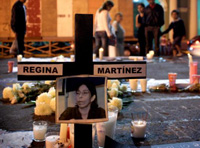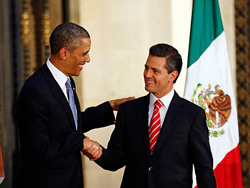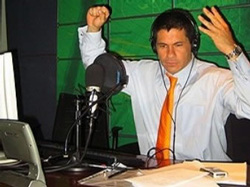redo Jump to...
print Print...

A photograph of slain journalist Regina Martinez hangs on a cross during a vigil in Xalapa, Mexico. The Proceso newsmagazine correspondent often wrote about drug trafficking.
(by Deborah Hastings, New York Daily News) – Mexico is the fourth most deadly country for reporters, topped only by battle-plagued Syria, Somalia and Pakistan, according to the most recent survey by media watchdog group Reporters Without Borders.
“Mexico’s violence, which has grown exponentially … targets journalists who dare to cover drug trafficking, corruption (and) organized crime’s infiltration of local and federal government,” the report said.
According to the New York-based Committee to Protect Journalists, more than 50 journalists in Mexico have died or disappeared since 2006, when incoming president Felipe Calderon [president from 2006-2012] declared war on drug cartels and launched a high-profile media campaign that paraded arrested drug thugs and seized heroin, guns and cocaine before the public. …
Calderon’s term ended in December 2012, and so did the much-hyped perp walks of drug suspects.

President Obama shakes hands with Mexican President Peña Nieto after a joint news conference at the National Palace in Mexico City on Thursday, May 2, 2013.
New president Enrique Pena Nieto has a markedly different stance on drug cartels. Earlier this year, it announced that local and state authorities would no longer work directly with U.S. agencies, including the FBI and the DEA, when it came to sharing drug tracking intelligence.
Arriving in Mexico Thursday for private talks with Pena Nieto, President Barack Obama side-stepped the controversial policy change, saying it was “up to the Mexican people” to determine its own security issues. [President Obama and President Pena Nieto also held a joint news conference in Mexico City on Thursday. The Associated Press reported that: “Seeking to put a new spin on a long-standing partnership, Obama is promoting jobs and trade – not drug wars or border security – as the driving force behind the U.S.-Mexico relationship.”]
Meanwhile, the atrocities against journalists have mounted.

Mexican journalist David Paramo’s two sons were murdered on Saturday.
Two sons of prominent Mexican journalists were shot to death over the weekend in the northern city of Chihuahua, a spokesman for the state attorney general’s said Sunday. Alfredo Paramo, 20, and Diego Paramo, 21, were shot dead early on Saturday after being chased by gunmen in a car, said Carlos Gonzalez.
Their parents are well-known Mexican financial journalist David Paramo, who hosts a radio show, appears on TV Azteca and has a national newspaper column, and Martha Gonzalez, the editor of the local El Peso newspaper.
Last week, radio and television announcer Jose Gerardo Padillo Blanquet vanished in Saltillo, the capital of Coahuila, which is crisscrossed with illicit smuggling routes and controlled by the Los Zetas cartel, arguably the most violent drug syndicate in Mexico .
Blanquet works for Radio Grande de Coahuila, whose director was beaten a few months ago. The media outlet also has received numerous threats over its narcotics coverage, according to local reports.
Just last week in the same city, the hacked remains of photographer Daniel Alejandro Martinez, 22, who had just started working for the Vanguardia newspaper, were found in the middle of a busy street. …
Even bloggers and Twitter users aren’t safe. As journalists and their employers have backed off reporting on drug cartels for fear of bloody reprisals, social media users have stepped into the void, trying to inform terrified residents of drug cartel violence.
In February, a gruesome video – much like the ones Islamist terrorists posted of journalist Daniel Pearl’s 2002 decapitation in Pakistan – surfaced on YouTube.
In it, a man on his knees talks about Facebook page Valor Por Tamaulipas, (Courage For Tamaulipas) which posts security updates for the state of Tamaulipas. It hugs the southern border of Texas on the Gulf of Mexico. He calmly warns social media users to stop what they’re doing.
“Please refrain from publishing any information – if not, this is the price you will pay,” he says before a masked man appears to shoot him in the head.
“People are turning on to social media because in many areas throughout Mexico, organized crime has taken control of entire territories,” Carlos Lauria of the Committee to Protect Journalists, told The News. Another popular, and endangered, site is called Blog del Narco. [Blog del Narco is a social media site that follows drug cartel violence and warns residents where narcotraffickers are operating. It has so far kept going despite being threatened by organized crime syndicates.]
“It’s a war being fought in the streets and it’s a war for information,” Lauria said. “People are terrified. And so are the journalists.”
Reprinted here for educational purposes only. May not be reproduced on other websites without permission from the New York Daily News.
Photojournalist
Questions
1. List the three other countries that are more dangerous for journalists than Mexico.
2. Who is murdering journalists in Mexico? Why?
3. How many journalists have been murdered or have disappeared in Mexico in the past 7 years?
4. How has Mexico’s new President changed the government’s policy on dealing with the drug cartel scourge in Mexico?
5. What is President Obama’s policy on the out of control violence perpetrated by drug cartels in Mexico?
6. How have reporters in Mexico responded to the violence against them?
7. Social media users have stepped into the void, trying to inform terrified residents of drug cartel violence. If the government does not crush the cartels, what type of reporting on the cartels’ actions do you think will be done in the future? Explain your answer.
8. The reporter implies that the policies of former President Calderon have caused reporters to be murdered by the drug cartels. However, the violence has not ended under President Pena Nieto. What do you think is the real problem in dealing with cartels and drug violence in Mexico?
Background
Drug cartels are criminal organizations developed with the primary purpose of promoting and controlling drug trafficking operations. They range from loosely managed agreements among various drug traffickers to formalized commercial enterprises.
The term (drug cartels) was applied when the largest trafficking organizations reached an agreement to coordinate the production and distribution of cocaine. Since that agreement was broken up, drug cartels are no longer actually cartels, but the term stuck and it is now popularly used to refer to any criminal narcotics related organization, such as those in Colombia, Guatemala, …Mexico, Afghanistan, and Pakistan. (from wikipedia)
The Committee to Protect Journalists (CPJ):
- CPJ is a New York based organization which promotes press freedom worldwide and defends the right of journalists to report the news without fear of reprisal. CPJ takes action wherever journalists are censored, attacked, imprisoned, or killed for their work.
- Journalism plays a vital role in the balance of power between a government and its people. When a country’s journalists are silenced, its people are silenced. By protecting journalists, CPJ protects freedom of expression and democracy. (from cpj.org)
Reporters Without Borders:
Reporters Without Borders (also Reporters Sans Frontières, RSF) is a France-based international non-profit,non-governmental organization that promotes and defends freedom of information and freedom of the press. The organization has consultant status at the United Nations.
Reporters Without Borders has two primary spheres of activity: one is focused on Internet Censorship and the New Media, and the other on providing material, financial and psychological assistance to journalists assigned to dangerous areas. Its missions are to:
- continuously monitor attacks on freedom of information worldwide;
- denounce any such attacks in the media;
- act in cooperation with governments to fight censorship and laws aimed at restricting freedom of information;
- morally and financially assist persecuted journalists, as well as their families; and
- offer material assistance to war correspondents in order to enhance their safety
RWB compiles and publishes an annual ranking of countries based upon the organization’s assessment of their press freedom records. (from wikipedia)
Resources
Read about “Operation Fast and Furious” – – an Obama administration program that put guns in the hands of members of Mexican drug cartels, which they in turn have used to kill many Mexicans, and at least one U.S. border agent, Brian Terry, at: en.wikipedia.org/wiki/ATF_gunwalking_scandal.
As a result of a dispute over the release of Justice Department documents related to the scandal, Attorney General Eric Holder became the first sitting member of the Cabinet of the United States to be held in contempt of Congress on June 28, 2012. Earlier that month, President Obama had invoked executive privilege for the first time in his presidency over the same documents.
Daily “Answers” emails are provided for Daily News Articles, Tuesday’s World Events and Friday’s News Quiz.




